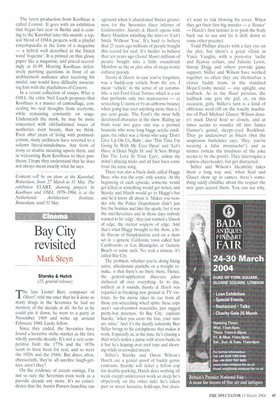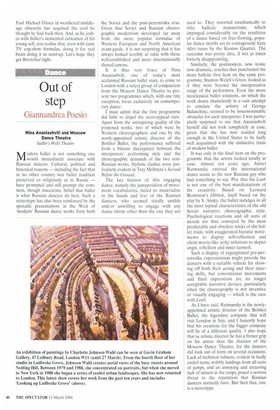Bay City revisited
Mark Steyn
Starsky & Hutch (15, general release)
The late Lionel Bart, composer of Oliver!, told me once that he'd done so many drugs in the Seventies he had no memory of the decade at all. As far as he could pin it down, he went to a party in November 1969 and woke up around February 1980. Lucky fellow.
Since they ended, the Seventies have found a lucrative niche market as the first wholly parodic decade. It's not a very competitive field: the 1770s and the 1870s seem to have been for real, and so were the 1920s and the 1940s. But disco, afros, cheesecloth, they're all surefire laugh-getters, aren't they?
On the evidence of recent outings, I'm not so sure the Seventies even work as a parodic decade any more. It's no coincidence that the Austin Powers franchise ran aground when it abandoned Sixties grooviness for the Seventies disco inferno of Goldmember. Starsky & Hutch opens with Barry Manilow whistling the intro to 'Can't Smile Without You'. It's hard to believe that 25 years ago millions of people bought this record for real. It's harder to believe that ten years ago (Serial Mom) millions of people bought into a little soundtrack Manilow as the ne plus ultra of mega-ironic cultural parody.
Starsky & Hutch, in case you've forgotten, was a buddy-cop vehicle from the era. I mean 'vehicle' in the sense of an automobile: a red Ford Gran Torino, which is a car that performs only two manoeuvres — a) screeching U-turns or b) an airborne bounce when going fast over anything more than a 2 per cent grade. The Ford's the most fully developed character in the show. Riding up front were two guys: one was a permed brunette who wore long baggy acrylic cardigans; the other was a blond who sang 'Don't Give Up On Us, Baby', also 'This Time I'm Going In With My Eyes Open' and 'Let's Have A Quiet Night In' and 'It Sure Brings Out The Love In Your Eyes', unless my mind's playing tricks and all four lines come from the same song.
There was also a black dude called Huggy Bear, who was the cops' only source. At the beginning of each episode, someone would get killed or something would get stolen, and Starsky and Hutch would go to Huggy's bar and he'd know all about it. Makes you wonder why the Police Department didn't just fire the honkies and hire the spade, but it was the mid-Seventies and in those days nobody wanted to be 'edgy', they just wanted a frisson of edge, the merest soupcon of edge. And that's what Hugg brought to the show, a little flavour of blaxploitation cool on a show set in a generic California town called San Cardboardo or Los Blandgeles or Generic Beach or some such. No, wait a minute, it's called Bay City.
The problem, whether you're doing biting satire, affectionate pastiche or a straight remake, is that there's no there there. Hence, the general-application disco-era jokes slathered all over everything. In its day, unlikely as it sounds, Starsky & Hutch was regarded as breaking new ground in TV violence. So the movie takes its cue from all those tyre-screeching wheel spins: these cops aren't out-of-control mavericks, just rugged pretty-boy preeners. 'In Bay City, explains Starsky, 'when you cross the line, your nuts are mine.' And it's the deadly solemnity Ben Stiller brings to his catchphrase that makes it work. Especially as, at the time, he's chasing a thief who's stolen a purse with seven bucks in it but he's leaping over roof tops and shooting wildly in crowded streets.
Stiller's Starsky and Owen Wilson's Hutch are a genial spoof of buddy genre contrasts. Starsky will ticket a fellow cop for double-parking, Hutch does nothing all week except undercover work so deep he's objectively on the other side: he's taken part in seven lucrative hold-ups, but does n't want to risk blowing his cover. When they get their first big murder — a 'floater' — Hutch's first instinct is to push the body back out to sea and let it drift down to some other precinct.
Todd Phillips directs with a lazy eye on the plot, but there's a great villain in Vince Vaughn, with a porn-star 'tache and flyaway collars, and Juliette Lewis, Snoop Dogg and others provide game support. Stiller and Wilson have worked together so often they are themselves a classic buddy team, in the standard Hope/Crosby mould — one uptight, one laidback. As in the Road pictures, the laidback one gets the girl, or, on this occasion, girls. Stiller's turn is a kind of oblivious nerd riff on the touchy machismo of Paul Michael Glaser; Wilson doesn't track David Soul so closely, and at times seems to wander off into James Garner's genial, sleepy-eyed Rockford. They go undercover as bikers (but the suspicious bartender says, 'Hey, you're wearing a false moustache') and as mimes (where the tiredness of the joke seems to be the point). They interrogate a topless cheerleader, but get distracted.
Stiller and Wilson's likeability takes them a long way and, when Soul and Glaser show up in cameo, there's something oddly childlike about the respect the new guys accord them. You can see why. Paul Michael Glaser in weathered middleage obscurity has acquired the cool he thought he had back then. And, as he joshes with Stiller's demented caricature of his young self, you realise that, even with lame TV cop-show formulas, doing it for real beats doing it as send-up. Let's hope they get Bewitched right.



































































 Previous page
Previous page